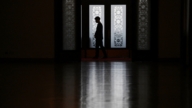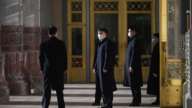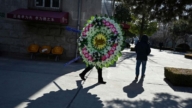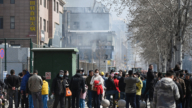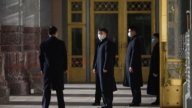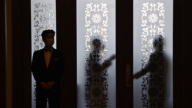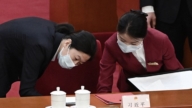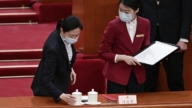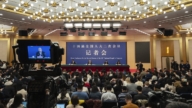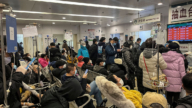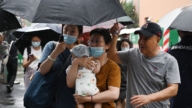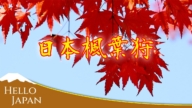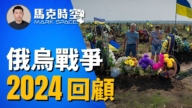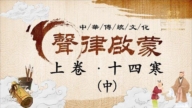【新唐人2014年03月15日訊】中共「兩會」後,最後記者招待會,遭到輿論抨擊,外媒形容記者是跑龍套,敏感問題、實質問題都沒有涉及。事後不少記者曝光,他們在記者會前,已經被警告,不能涉及周永康等敏感問題,否則會上「黑名單」。有評論指出,中共一方面對記者進行打壓來控制輿論,另一方面使用假記者、和假記者會製造輿論自由的假象,已經威懾到整個人類的安全。
據香港《南華早報》英文網披露,中共外交部和政府新聞辦公室,在記者會前告訴記者,現在提問周永康問題還太早,誰這麼做了就會被列入黑名單,不會獲得再提問機會。
13號,600名中外記者出席的記者會上,15家提問的中外媒體,沒有一家媒體涉及最受各界矚目的周永康案。 而中、日緊張關係,新疆西藏及人權等國際關注議題,也沒有記者提出。
《德國之聲》形容這場記者會,記者是在大型表演秀裏,跑龍套。
採訪過「兩會」的海外記者向香港《蘋果日報》透露,「兩會」會務組新聞辦手中有一份所謂「友好媒體」及「可信賴記者」名單,記者會前,官員會假裝「了解輿情」,問記者「會關心甚麼問題」,只有當記者的問題符合當局期待,纔可能列入候選。
官員建議被選中的記者穿得「鮮艷醒目」一點,記者會上,官員還派人陪記者佔醒目位置,方便主持人「點中」。另一方面,「違約」記者將被列入黑名單,以後不但無法採訪兩會或總理記者會,甚至可能無法獲得駐京採訪簽證。
前《陜西電視臺》記者馬曉明指出,在中國要想衝破中共的鉗制,披露中國的真實問題,不但要具備記者的責任感,還必須有無所畏懼的勇氣。
前陜西電視臺記者馬曉明:「我不做中共的記者(後),進行獨立的採訪,被拘留、被打、被罵,被收了照相機,最常見的辦法就是在互聯網和電話上監控,進行破壞和搗亂。還有跟蹤,敏感時期被帶出去,派別人監視我,勞教等等都有過。」
馬曉明家裏的網絡從2月22號開始,一直持續到「兩會」結束,不能上網,而記者打電話時,他的電話一直是忙音,5小時後才接通,馬曉明說,他一個電話也沒打過。
原《山西青年報》記者高勤榮,因揭露當地官員的腐敗,被冤判12年, 2006年服獄8年出來後,儘管當局承認冤判,卻至今還沒有恢復他的工作。
前貴州《畢節日報》記者李元龍:「各種限制、種種的捆綁,一個是讓你不說,或者一個是讓你說假話,這個就和你的做人的品格,和記者的職業良知是衝突的,非常痛苦的。」
去年12月,中國當局拒絕更新美國《紐約時報》和《彭博社》24名駐京記者的簽證,迫使他們離開中國,而美國有線電視新聞網《CNN》記者在北京採訪時,攝像機被警方暴力毀壞。
去年11月8號,中共政府又拒絕給《路透社》駐北京資深記者慕亦仁發放簽證,拒絕他回北京。
美國紐約城市大學政治學教授夏明:「在中國要做記者的話,西方的記者越是獨立性越強,越想問些尖銳的問題的,中共政府根本就讓你採訪不到任何東西,對記者的攝像器材進行破壞,人身進行攻擊、傷害,在這種情況下,他們的生存處境也非常艱難。」
據報導,在政協某記者會上,曾有日本記者「無意」拿到提問的麥克風,剛開口要問「禽流感」問題,主持人打斷他說「不是給你的」,喝令他交出麥克風。
夏明:「西方的國家應該共同地捍衛他們的言論自由和新聞自由,同時必須讓西方國家的所有的老百姓明白,如果他們的記者沒辦法準確地把中國的信息報導到西方國家來的話,不僅是損害中國人的利益,其實也損害西方人的利益。」
美國「紐約城市大學」政治學教授夏明指出,中國的未來將影響到世界其他國家的安全和穩定,另外,西方國家的很多資本投在中國,他們有權利了解中國的狀態。
採訪編輯/劉惠 後製/李智遠
Two Meetings Press Conference: Reporters Warned Not To Question About Zhou Yongkang
International media have criticized the press
conference that was held after the Chinese
Communist Party's (CCP) Two Meetings.
Reporters “play a small role" in the event, by
not asking any sensitive and essential questions.
A number of reporters revealed after the conference that
they were warned in advance not to ask sensitive questions.
Issues deemed sensitive included Zhou Yongkang,
and violation would risk being placed on a blacklist.
Commentators suggest that on the one hand, the
Chinese regime wants to control public opinion.
On the other hand, it uses fake reporters
to create an illusion of freedom of speech.
This threatens fundamental and universal human rights.
According to Hong Kong's South China Morning Post,
the CCP Foreign Ministry and Government Press
Office spoke to reporters before the conference.
The reporters were told that it's too
early to mention Zhou Yongkang.
Whoever asks about this would be placed on a blacklist,
meaning they won't have a chance to ask further questions.
attended the conference on March 13.
Representatives from fifteen media asked questions,
but there was no mention of Zhou Yongkang.
Other issues omitted were the currently tense Sino-Japanese
relationship, Xinjiang, Tibet, or any human rights concerns.
German media Deutsche Welle describes the
reporters as playing a small role in a large show.
Oversea reporters at the Two Meetings told
Hong Kong's Apple Daily that the press office
of the Two Meetings had two lists for media.
The lists were "friendly media" and "trusted reporters."
Before the conference started, officials asked reporters what
issues concerned them, pretending to learn public opinion.
Reporters were placed on the calling list only if
their questions qualified with the regimes standard.
The officials suggested that those reporters who
were selected should wear something eye-catching.
These reporters were also arranged obvious seats, to
make it easy for the host of the conference to find them.
Reporters acting against the rules were placed
on a blacklist, and prohibited from interviewing
at the Two Meetings and the press conference.
Those reporters may also risk losing their media visa.
Ma Xiaoming, a former reporter at state-run
Shaanxi Television, spoke about this issue.
If Chinese people want to break from the CCP's control
to speak about real issues, reporters not only need to
be responsible, but also be fearless and courageous.
Ma Xiaoming, former reporter: "Since I left the CCP's
state-run media and started to report independently,
I have been detained, beaten, and sworn at.
My camera was taken, and the most common
method is to control and interfere with my internet.
I was also followed, taken away by police during
sensitive times, monitored, and placed in a labor camp.”
The internet at Ma's home has
been cut-off since February 22.
When our reporter called him, his phone
was busy for 5 hours before it connected.
Ma said that he wasn't on the phone.
Gao Qinrong, a former reporter at Shanxi Youth
Daily, was sentenced to 12 years imprisonment.
This sentence was given for revealing
the corruption of a local official.
Gao was released in 2006, after 8 years detention.
Although the authorities admitted that his sentence was
wrongfully given, Gao's journalistic work has not resumed.
Li Yuanlong, former reporter, Bijie Daily, Guizhou City:
“There are all kinds of restrictions and controls.
You are either not allowed to speak, or you are forced to lie.
This is against one's personality and one's
conscience as a reporter. It's extremely painful."
In December last year, the Chinese authorities
refused to renew Beijing visas for 24 reporters
from U.S. based New York Times and Bloomberg.
The reporters were forced to leave China.
When reporters of U.S. news channel
CNN were reporting about it in Beijing, their
camera were violently destroyed by police.
The CCP refused to issue a visa for Paul Mooney, a
senior reporter at Reuters, on November 8 last year.
Professor Xia Ming, Political Science, City University
of New York: "The more independent western reporters
are, the sharper questions they want to ask in China.
The CCP regime controls them more,
so that reporters can't get any news.
The CCP destroys reporters' cameras and attacks them.
Under these conditions, their lives are made very tough."
During a press conference of the CPPCC meeting,
a Japanese reporter accidentally got the microphone.
He began asking a question about bird flu, and his


